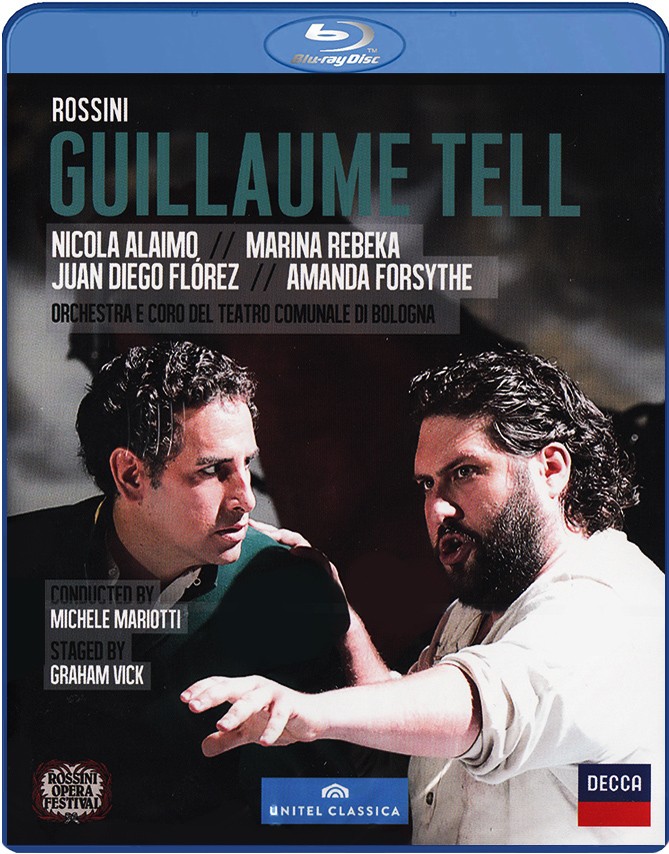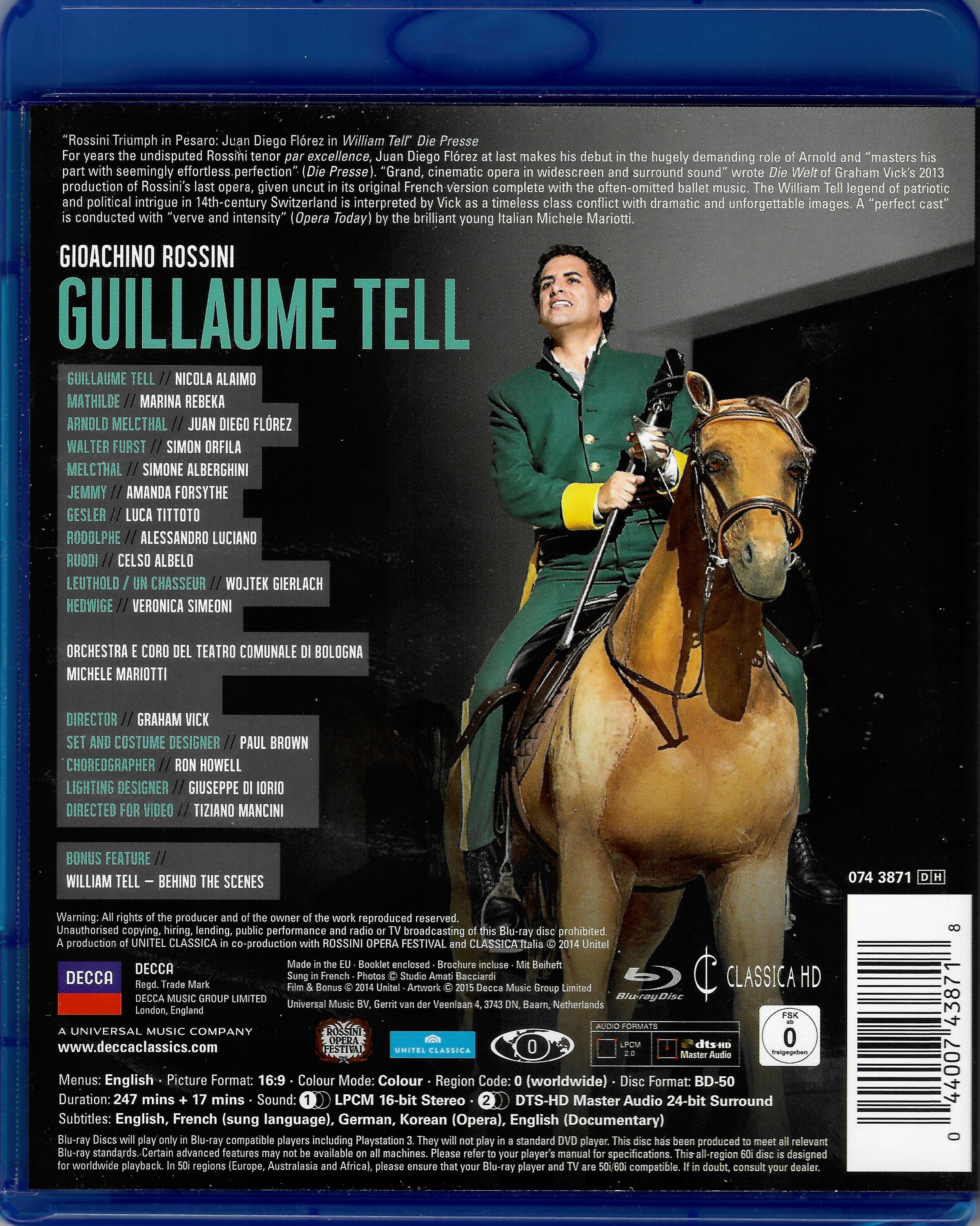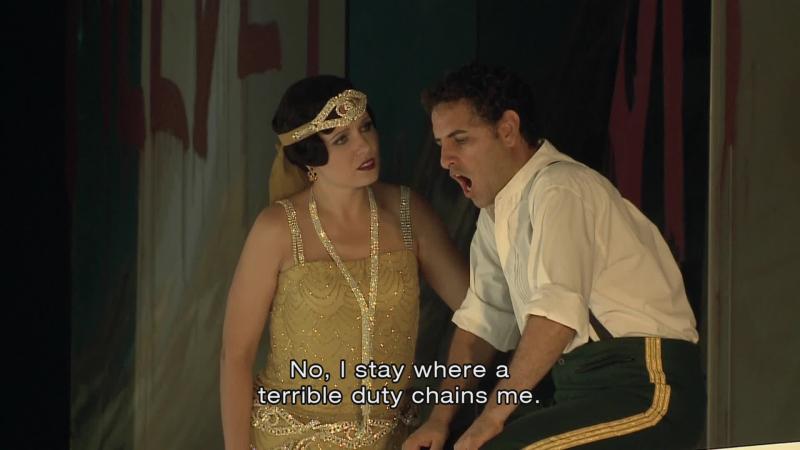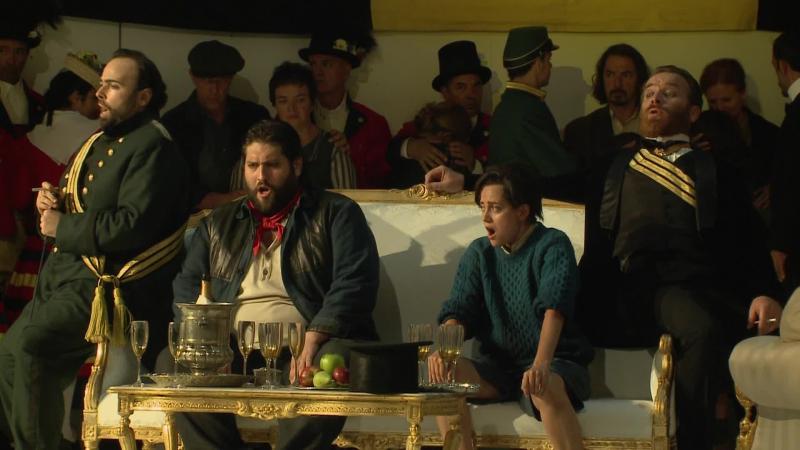

Rossini Guillaume Tell opera to a libretto by Étienne de Jouy and Hippolyte Bis. Directed 2013 by Graham Vick at the Rossini Opera Festival in Pesaro. Stars Nicola Alaimo (Guillaume Tell), Juan Diego Flórez (Arnold Melcthal), Marina Rebeka (Mathide), Amanda Forsythe (Jemmy), Veronica Simeoni (Hedwige) Simon Orfila (Walter Furst), Simone Alberghini (Melcthal, Arnold's father), Luca Tittoto (Gesler), Alessandro Luciano, (Rodolphe), Celso Albulo (Ruodi), and Wojtek Gierlach (Leuthold/Hunter). Michele Mariotti conducts the Orchestra e Coro del Teatro Comunale di Bologna (Chorus Master Andrea Faidutti). Set and costume designs by Paul Brown; choreography by Ron Howell; lighting design by Giuseppe Di Iorio. Directed for screen by Tiziano Mancini. Sung in French. Released 2015, disc has 5.1 dts-HD Master Audio. Grade: A-
Guillaume Tell is a French grand opera, and one usually expects to see grand opera presented as a vast spectacle in a major opera house with lavish sets, costumes, and props supporting a famous cast of singers and an elaborate ballet. (For a modern production of a French grand opera done this way, see our review of the Verdi Les vêpres siciliennes staged at the Royal Opera in 2013.) The critics seem to agree that the singers in this Guillaume Tell are about as good as any group recently put together for a recording of this opera. But this production didn't take place in a real opera house. It was performed in Pesaro at the 2013 Rossini Opera Festival at the Adriatic Arena:
The Adriatic Arena is primarily a sports venue seating 15,000 for professional basketball. For the summer opera festival, a small opera house seating 1500 is assembled inside the huge building. A special set is built for the Rossini opera to be staged that year. These sets have often been ingenious, but there are severe limitations on what the designers can do. In the next screenshot below, which comes from the end of Guillaume Tell, you see how a "scenery malfunction" on the back wall of the set accidentally exposed some of the seats in the sports arena with cast members sitting around waiting for their curtain calls.
Of course, the show went on. But this humorous event does illustrate how challenging it must be to stage a French grand opera in an improvised space (like a Roman arena, a stage floating in a lake, or a sports stadium). To do this, you have to call in a director who will grin, bear it, and improvise. Enter Graham Vick, "known for his experimental and revisionist stagings of traditional and modern operas" (Wikipedia). To Vick, the Pesaro set isn't a huge headache—it's a carte blanche to have fun:
At Pesaro, the orchestra doesn't have a pit. The harp sticks up 3 feet above the stage floor. Good thing the score doesn't call for four harps!
And there's no regular curtain. No problem---just make a big banner to raise and lower like they used to do on May Day in Moscow:
The single set is a big, plain, luminous triangle with a video screen across the back, a room on the left that can be revealed with a sliding door, a balcony, and a sort of fly space. The Latin words EX TERRA OMNIA are on the back wall. The best translation for this would probably be "All comes from the earth." This whole opera is all but full of beautiful chorus singing. Below we see the peasants lamenting their troubles with foreign domination. This sure does look like a number of stagings we have from Christof Loy, who specializes in ultra-low-cost productions:
Vick himself says (in a bonus extra) that it would be kitsch to try to depict the Alps on this limited stage. The art of the theater is, he insists, to show human nature. Well, this gives Vick a lot of leeway. In the next shot we see a number of Vick ideas: the aristocratic Austrians in their separate quarters look down on the peasants at work cleaning a floor, a large painting shows the Matterhorn reflected in a lake that could not exist at the foot of an Alpine peak, a boat will cross a river by being lifted into the fly, and a movie camera with electric lights will be used by the German-speaking oppressors to record the humiliation of the peasants. Much of this is incongruous with a tale about a shooting a crossbow, a weapon that disappeared with the invention of gunpowder. Vick is, of course, knows this. He's throwing out human-nature archetypes across the stage for us to assemble in our minds in a collective consciousness of bad guys and good guys:
The big man in the middle is Nicola Alaimo as Guillaume (or William in English) Tell. To your left in the blue sweater appears Amanda Forsythe in pants as Tell's son Jemmy. To your right is Veronica Simeoni as Tell's wife Hedwige:
Vick mixes in some folklore with a shepherd wedding celebration in traditional costumes:
Simone Alberghini portrays Father Melcthal, the village patriarch. Here he blesses the couples soon to be married with a tiny sermon on the virtues of work, marriage, and love. The villagers are conservatives, not revolutionaries. They remind me of the American colonialists in 1775. They just want to be left alone:
French grand opera calls for big ballet acts. The Pesaro management told Vick to mix the dancing in with the plot to make it relevant to the modern audience. So here the peasant celebration is graced with 12 dancers doing 21st-century radical stuff complete with spastic gyrations, tumbling, sexually suggestive moves, etc. Human nature trumps historical accuracy. David Shengold, writing in the September 2015 Opera News (page 79) says this "pretentious, mannered choreography . . . beggars belief." It's hard to please everybody:
Suddenly the celebrations are interrupted by pleas for help from peasant Leuthold (Wojtek Gierlach). Leuthold killed a soldier who raped his daughter, and now the law is hot pursuit. Leuthold needs to flee to the other side of the river. Only Tell is strong enough to manage the boat in the raging river, and he helps Leuthold escape:
When the soldiers arrive, they beat Father Melcthal to death trying (unsuccessfully) to get him to name the person who helped Leuthold. This ends Act 1, and we now know who is good and bad:
But where's our love story? Hang on, we have a doozie for you. Father Melcthal's son is Arnold (Juan Diego Flórez). He joined the Austrian Army to get ahead. He's already been a hero in battle and along the way he managed to save the life of Princess Mathilde by carrying her out of an avalanche! The Princess has a democratic streak in her soul and now she's in love with Arnold. In the next two screenshots they secretly meet and declare their love. They agree that Arnold should continue his army career; with more glorious victories, Arnold can be ennobled and marry Mathilde:
In the two screenshots above, you see several of 13 magnificent horse props Vick puts on the stage at the beginning of Act 2. The horses are inspired no doubt by the famous "cavalry music" that concludes the Overture to Guillaume Tell. It's hard for me to believe that Vick decided on horses first and then went out to find some. I suspect he knew about them even before he was hired to as director. Once he got the Tell contract, the horses were too good to resist. But after you put them on the stage, don't they have to stay put for the rest of Act 2? Well, no problem for Vick. As the act progresses, the peasants will just put some of the horses on their sides and use them for chairs, and later they will stack them up like barricades.
Suspicious about Arnold and Mathilde, Tell confronts Arnold and asks . . .
Then Walter Furst (Simon Orfila) gives Arnold the bad news of the death of Father Melcthal:
Enraged at his father's murder, Arnold throws in his lot with the peasants. Now the three legendary freedom fighters (Tell, Melcthal, and Furst) have joined forces:
And the poor Princess learns that Arnold has abandoned his hopes of becoming an aristocrat:
The commander of the occupiers is the red-bearded Governor Gesler (Luca Tittoto) shown below seated to the left of the coffee table. To some of the most delightful, light-hearted folk music anyone ever wrote, Gesler and his guests humiliate the peasants while they dance in traditional costumes. To the far right in the picture lies the carcass of the white horse we saw earlier, whose head has been severed and is still lying on the floor as an archetype of deadly decadence:
At the end of the dancing soldiers drag many of the girls away to other rooms and the crowd bows before Gesler in terror, except for Tell, who still stands erect:
Below on the left is Allessandro Luciano playing Rodolphe, chief of the bodyguards. Now the captors and captives sing a remarkable quartet of deadly enemies with (from your left to right) a tenor, baritone, soprano, and bass. David Shengold in his Opera News review says that Amanda Forsythe's Jemmy "affords the best singing of this crucial part I've ever encountered."
The habits of parents die hard:
A tricky event to stage! Here Jemmy has a plate on his head to protect him from the fireworks:
A guard discovers an extra arrow that was intended for Gesler if Jemmy had come to harm. Gesler condemns both father and son anew to death. Princess Mathilde pulls rank on Gesler to save Jemmy:
Soon all the cantons are in rebellion. Jemmy sets fire to the ancestral home place to serve as a navigation beacon. Oh dear, all Vick can come up with for this is a wee fire on the kitchen table:
Is the Governor's name "Gesler" or "Gessler"? Decca uses Gesler in the keepcase material. But Gessler looks more German:
And Princess Mathilde goes over to the peasant cause so she can be with her lover:
So what to make of this four-hour show? All I personally know about this opera comes from recent viewings in my home theater. Right now, I can't think of any other "adventure" opera with more glorious music for orchestra, chorus, and soloists than Guillaume Tell. Because of its length and difficult tenor role, it might be the most under-performed of all the famous great operas. For those with home theaters, this Pesaro recording is for now the only HDVD available. But what do experienced critics think about this title?
First let's hear from our own Wonk John Aitken, who gave us the following comment:
"This superb performance from the Rossini Festival in Pesaro is directed by Graham Vick who provides a cogent and intelligent staging much enhanced by Ron Howell's excellent choreography. This is particularly effective in the long ballet sequences, an essential for French Grand Opera at the time. Rather than presenting them as separate from the action, Vick and Howell integrate the ballet completely, which in the third act provides a richly satisfying scene where the Swiss in national costume are made to dance to entertain the Austrian elite who, under Gesler's lead, completely humiliate them. This humiliation leads seamlessly into the famous apple on the head scene, and I cannot praise Vick and Howell enough for getting this spot on. The rest of the production is similarly inventive.
However this opera requires superb singing to make its mark and luckily here such singing is provided in profusion. Juan Diego Flórez and Marina Rebeka excel as Arnold and Mathilde, while Nicola Alaimo as Tell and Amanda Forsythe as Jemmy are both first rate. The stratospheric high notes for Arnold hold no terrors for Mr. Flórez, whose voice is naturally at ease in the upper strata. His acting too is heartfelt and natural and with Marina Rebeka he finds an ideal partner. Nicola Alaimo is not so hot in the acting stakes, but his performance is beautifully sung. Amanda Forsythe in the trouser role of Tell's son Jemmy is equally affecting and makes a very believable boy. Luca Tittoto makes an excellent Gesler and the other parts are very well taken. Young Michele Mariotti conducts with an unerring understanding of Rossini's score and coaxes wonderful playing from the Orchestra of the Communale in Bologna. Absolutely brilliant. Highly recommended."
But director Vick's approach is sure to rejected by other more traditionally-minded critics. Richard Osborne, writing in the July 2015 Gramophone at page 7, while praising the music states that, "Sadly, this being a video, there is also a production to digest." Osborne thinks Vick is a closet Marxist and complains that Vick turns "the opera's many folk-dance sequences into bespoke horror shows in which the . . . Romanov-style courtiers mammock the country's crippled peasantry."
The PQ for this Guillaume Tell is excellent. The SQ is only adequate. Too often the bass notes seemed blurred and distorted. But the balance between the singing and the orchestra is fine, and the subtitles in English are good.
I'm going to side with John Aitken and give this title a good grade on account of the wonderful music supported by Vick's interesting and colorful stage displays of human nature. But I still wonder about Vick's dictum (also in the bonus extra) that showing nature on a stage is kitsch. I still think a traditional or even realistic updating of Guillaume Tell in a big opera house with an ample budget for sets, costumes, and props might be terrific even today. So my grade for this show is A-, which includes a reduction for the weak SQ and leaves room for a better-balanced show in a big house to get an A orA+.
Update: A little later, the Royal Opera mounted a new production of Guillaume Tell which had a controversial nude rape scene. This came out in due course as a Blu-ray title.
OR






























